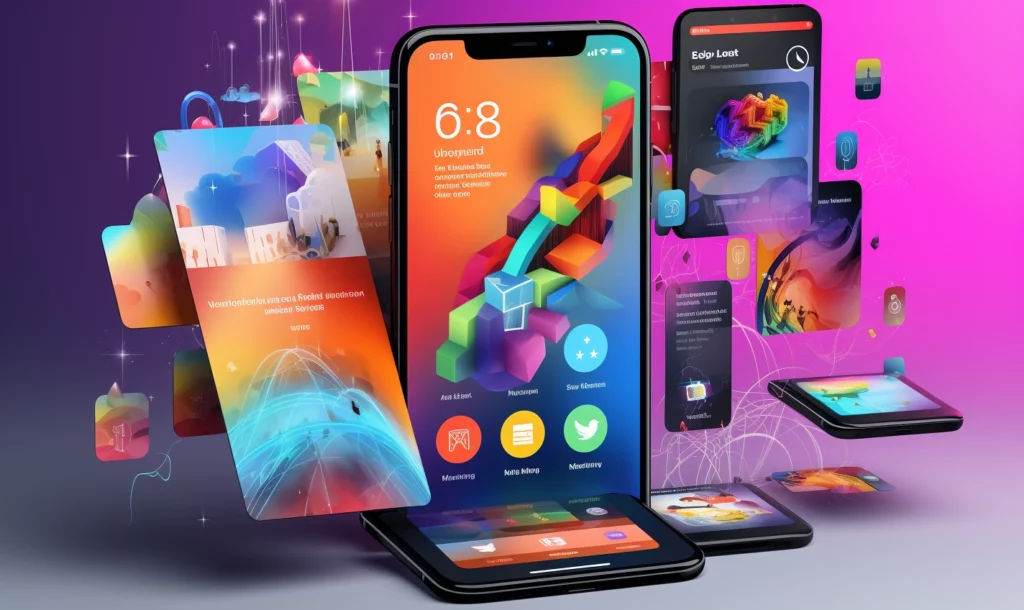In 2024, the digital landscape is evolving at an unprecedented pace. With the number of smartphone mobile network subscriptions worldwide reaching almost 6.4 billion in 2022 and forecasted to exceed 7.7 billion by 2028, the importance of mobile app development cannot be overstated (source: Statista – Smartphone mobile network subscriptions worldwide 2016-2028). This guide aims to provide a comprehensive overview of the mobile app development process, highlighting the significance of choosing the right mobile app developer and staying updated with the latest industry trends.
Mobile vs. Web Apps: Which One is Right for Your Business?
Both mobile and web apps have their unique advantages, and the decision largely depends on your business goals and target audience. Mobile apps are specifically designed for handheld devices and can tap into device-specific features, such as cameras, GPS, and push notifications. They offer a more personalized experience and can function offline. On the other hand, web apps are accessible via web browsers and don’t require any downloads or installations. They are easier to maintain and update, but might not provide as immersive an experience as mobile apps.

Embracing Cutting-Edge Technologies
The mobile app industry is continuously evolving, with technologies like Artificial Intelligence (AI), Augmented Reality (AR), and Virtual Reality (VR) taking center stage. These technologies can significantly enhance user experience. For instance, AI can be used for personalized recommendations, while AR and VR can provide immersive shopping or gaming experiences. However, it’s crucial to ensure that the integration of these technologies aligns with your app’s purpose and adds genuine value to the user (source: TechCrunch – How AI is revolutionizing mobile apps).
“The decision to leverage AI-driven features in our e-commerce app was a game-changer. We saw a 45% boost in sales, and our customers appreciated the personalized shopping experience. Truly the future of mobile apps!” – Rajesh Gupta, Founder of ShopEase.
The App Development Process

Design and user experience play a critical role in engaging and retaining users, while coding and development ensure the app functions optimally and securely across various devices and platforms.
Creating a successful mobile app requires a well-defined development process, from ideation and planning to design, coding, and final deployment. Thorough planning and ideation can ensure your app meets user needs, stands out in the competitive app market, and has a solid technical foundation.
1. Ideation and Planning

The foundation of any successful mobile app lies in thorough planning and ideation. By understanding user needs, researching the market, and creating a comprehensive, accurate timeline, developers can ensure the app delivers value and achieves its goals.
This stage also involves defining the app’s purpose, goals, and target audience, as well as creating a project plan that outlines the development timeline, resources, and milestones. By investing time and effort in the ideation and planning phase, developers can set the stage for a smooth development process and a successful final product.
2. Design and User Experience
An engaging and user-friendly design is vital for the success of any mobile app. This involves creating a visually appealing user interface, ensuring the app is easy to navigate, and optimizing it for different devices and platforms.
Creative and graphics designers play a crucial role in crafting visually appealing elements like:
- Iconography: Designing unique and intuitive icons that represent app functionalities and guide users through the app’s features.
- Illustrations: Creating custom illustrations that enhance the app’s aesthetics and resonate with the brand’s identity.
- Animations: Developing smooth and engaging animations that enhance user interactions and provide feedback.
- Typography: Selecting and customizing fonts that improve readability and align with the app’s design theme.
- Color Schemes: Choosing and implementing color palettes that evoke desired emotions and complement the overall design.
- Layouts: Designing adaptive layouts that ensure consistency across various screen sizes and orientations.
- Branding Elements: Incorporating brand logos, mascots, and other branding elements seamlessly into the app’s design.
- Interactive Elements: Crafting buttons, sliders, and other interactive components that are both functional and visually appealing.
- Visual Feedback: Providing users with visual cues and feedback, such as loading spinners or success animations, to enhance user experience.
- Theming: Creating multiple themes or skins for users to customize the app’s appearance according to their preferences.
User experience and user interface designers focus on creating intuitive layouts and smooth interactions between app components.
By prioritizing design and user experience, developers can create mobile apps that delight users and stand out from the competition.
3. Coding and Development
The coding and development phase is where the app’s functionality comes to life. This involves writing the code, testing the app thoroughly, and ensuring it is secure for users. Developers must choose the right programming languages and frameworks for the project, taking into account factors such as platform compatibility, performance, and scalability.
It’s essential to construct the app logic, which is responsible for connecting to back-end services, retrieving data, and updating back-end systems with new information created by the app. By focusing on coding best practices and rigorous testing, developers can create robust and reliable mobile apps that meet the highest standards of quality and usability.
If you’re curious about the retail mobile app development cost – you can check the guide “How to Estimate Retail Mobile App Development Costs: A Comprehensive Analysis for Entrepreneurs and Business Owners“.
App Store Optimization (ASO)

App Store Optimization (ASO) is a critical component of the mobile app development process, aimed at maximizing the visibility and downloads of your app. By optimizing elements such as:
- Title and Subtitle: Crafting a catchy and relevant title and subtitle for the app.
- Keywords: Researching and implementing high-ranking keywords relevant to the app.
- App Description: Writing a clear and compelling description that highlights the app’s features and benefits.
- Visuals: Designing eye-catching app icons, screenshots, and preview videos.
- Ratings and Reviews: Encouraging users to leave positive feedback and promptly addressing any concerns.
Developers can improve the app’s ranking in the Apple App Store search results and attract more potential users.
Tracking and analyzing the app’s performance is also essential for making continuous improvements and ensuring the app remains competitive in the ever-changing app store landscape.
Keyword Research and Implementation
Conducting keyword research and implementing relevant keywords is a crucial aspect of ASO. By uncovering and strategically incorporating keywords related to the app and its target audience, developers can improve the app’s search ranking and increase its visibility to potential users.
This involves brainstorming potential keywords, researching competitors and related apps, and using various keyword research tools to identify the most effective keywords for your app.
Encouraging Positive Reviews and Ratings
Positive reviews and ratings play a significant role in boosting an app’s visibility and attracting more users. By incentivizing users with discounts or rewards, simplifying the review process, and promptly responding to user feedback, developers can encourage users to leave positive reviews and ratings for their app.
Additionally, addressing negative reviews with professionalism and empathy, and offering solutions to improve user experiences, can help maintain a positive app store reputation and contribute to the app’s long-term success.
Monetizing Your Mobile App: Strategies and Trends
The mobile app industry has seen significant revenue generation over the past decade, with both Apple and Google benefiting immensely. In 2022, mobile ad spend reached a staggering $336 billion, marking a 13.8% increase from the previous year. However, consumer spending on Android and iOS apps saw a decline, amounting to $129 billion, a 3% decrease year-on-year (source: Business of Apps – App Revenue Data).

Key Revenue Insights:
“Despite that, we’ve created 20 apps in half a year. We’ve launched our products without any ads, and by now, we’ve reached 40,000 downloads. Our apps were totally free and without in-app purchases, as our main goal was idea verification.” – Founder of an unnamed mobile app company
Staying Ahead: Mobile App Trends to Watch in 2024

| Trend | Description |
|---|---|
| Artificial Intelligence (AI) and Machine Learning (ML) | AI and ML are expected to reshape app development in 2024, making apps more intelligent and efficient with features like image classification and speech recognition. |
| Cloud-Based Mobile Apps | With the rise of cloud computing, apps can now leverage remote servers to overcome storage constraints, making cloud-based mobile apps a significant trend for 2024. |
| Beacons Technology | While still underutilized, Beacons technology is anticipated to gain traction, with apps offering enhanced location-based experiences. |
| App Motion Design | Refined motion design can significantly enhance user engagement. For instance, Appinventiv’s integration in Domino’s app led to a 23% increase in conversion rate. |
| Augmented Reality (AR) and Virtual Reality (VR) | AR and VR continue to offer users immersive experiences, transforming the mobile app landscape. |
Navigating the Terrain: Challenges in Mobile App Development for 2024
Mobile app development is an intricate process, and while the rewards can be significant, developers often face a myriad of challenges. Here are some of the most pressing challenges anticipated for 2024:
| Challenge | Description |
|---|---|
| Finding an App Development Team | Assembling the right team with the necessary skills and experience is crucial. Beyond technical prowess, communication, UI design, and marketing skills are vital. |
| Scope Misunderstandings | Balancing features is essential. Overshadowing one feature with another can lead to scope issues, causing budget and timeline overruns. |
| Cross-platform vs. Native Apps | While cross-platform apps are more accessible and cost-effective, native apps offer a superior user experience tailored to specific platforms. |
| Keeping Up with OS Versions | With tech giants releasing new OS versions frequently, ensuring app compatibility becomes a significant challenge. |
| Choosing the Right Technology | With a plethora of technologies and frameworks available, selecting the right tech stack becomes a daunting task. |
| Designing for Different Devices | Ensuring a consistent and user-friendly design across varying screen sizes is paramount for user retention. |
| Security Issues | Protecting user data is paramount. As mobile apps become more integrated into daily life, ensuring robust security measures is a top priority. |
| Responsiveness | Ensuring that an app is responsive and provides a seamless experience across devices is crucial. |
| App Store Approval | Getting apps approved in various marketplaces can be a lengthy and sometimes unpredictable process. |
| Budget Constraints | Keeping the development process within budget while ensuring quality can be challenging. |
Choosing the Right Mobile App Developer
Selecting the right mobile app developer is crucial for ensuring a successful partnership and a high-performing final product. This involves assessing potential developers’ skills, experience, and track record, as well as their ability to communicate and collaborate effectively throughout the development process.
By conducting thorough research and evaluating portfolios, client reviews, and past projects, you can gain valuable insights into the reliability and quality of potential mobile app developers, helping you make an informed decision.
Assessing Skills and Experience

When evaluating potential app developers, it’s essential to examine their past work, projects, and results to assess their skills and experience. This can include reviewing their portfolio, case studies, and testimonials from previous clients.
By carefully assessing potential developers’ qualifications and experience, you can increase your chances of finding the best mobile app developers to bring your mobile app vision to life.
Communication and Collaboration
Clear communication and effective collaboration between the app developer and the client are essential for a successful development project. This involves:
- Regular Check-ins: Holding frequent meetings to discuss progress, address concerns, and align on goals.
- Feedback Loops: Implementing systems for continuous feedback and iteration.
- Collaboration Tools: Using tools like Slack, Trello, and Jira to streamline communication and task management.
- Documentation: Maintaining detailed documentation to ensure clarity and consistency throughout the development process.
By fostering a strong working relationship with your app developer, you can ensure a smooth development process and a final product that meets or exceeds your expectations.
Conclusion
While mobile app development offers immense opportunities, it’s not without its challenges. By being aware of potential hurdles and planning accordingly, developers can navigate these challenges and create successful, impactful apps.
FAQ: Frequently Asked Questions About Mobile App Development in 2024
What are the trending technologies influencing mobile app development in 2024?
AI/ML is leading the way, providing personalized recommendations, content, and assisting users with voice and chatbots. Other technologies include AR/VR and IoT integrations.
How does AI/ML impact mobile app development?
AI/ML offers personalized content and recommendations, assists users with voice commands, and predicts user behavior to enhance the user experience.
What are the benefits of outsourcing app development?
Outsourcing allows you to delegate the complexities of app development to experts, employ the latest technologies, and easily scale up or down based on user feedback and business needs.
How important is UI/UX design in app development?
UI/UX design is crucial as it creates the app’s user interface and user experience, ensuring that the app is user-friendly and meets users’ needs.
What are the potential challenges with cross-platform apps?
While cross-platform apps are more accessible and cost-effective, they may have limitations with device-specific features and potential performance issues.
How can I ensure faster page loading and a seamless user experience?
Consider using Single Page Applications (SPAs) that dynamically update content without reloading the entire page.
What is the estimated cost of mobile app development?
Costs vary based on the app’s complexity and features. For instance, web and mobile development might cost around $30,000-100,000, while UX/UI design could be around $6,000-10,000. This guide “How to Estimate Retail Mobile App Development Costs: A Comprehensive Analysis for Entrepreneurs and Business Owners” will help you to estimate app cost as well.
How can I protect my app idea during development?
Consider signing Non-Disclosure Agreements (NDAs) with potential partners or developers during the ideation phase.
How often should I update my app?
Update frequency depends on industry changes, user feedback, and technological advancements. Regular updates ensure compatibility and improved user experience.
How can I ensure my app’s success in app stores?
Continuous market research, addressing user feedback, and staying updated with industry trends can significantly enhance your app’s success rate.









